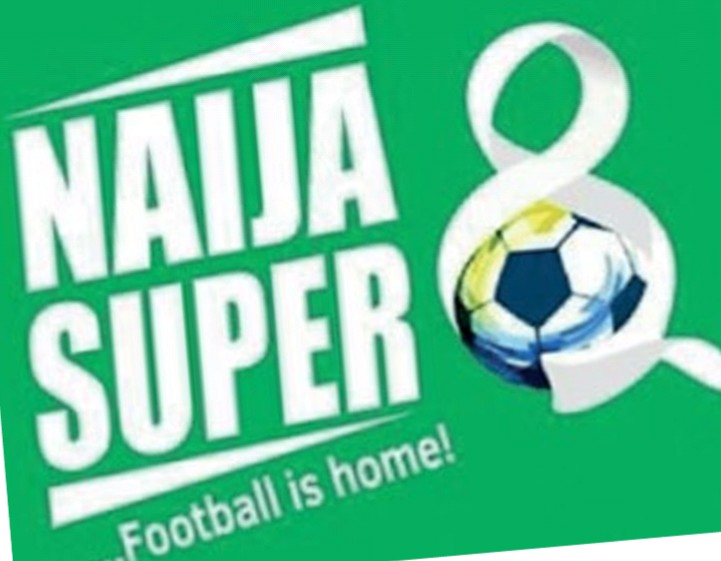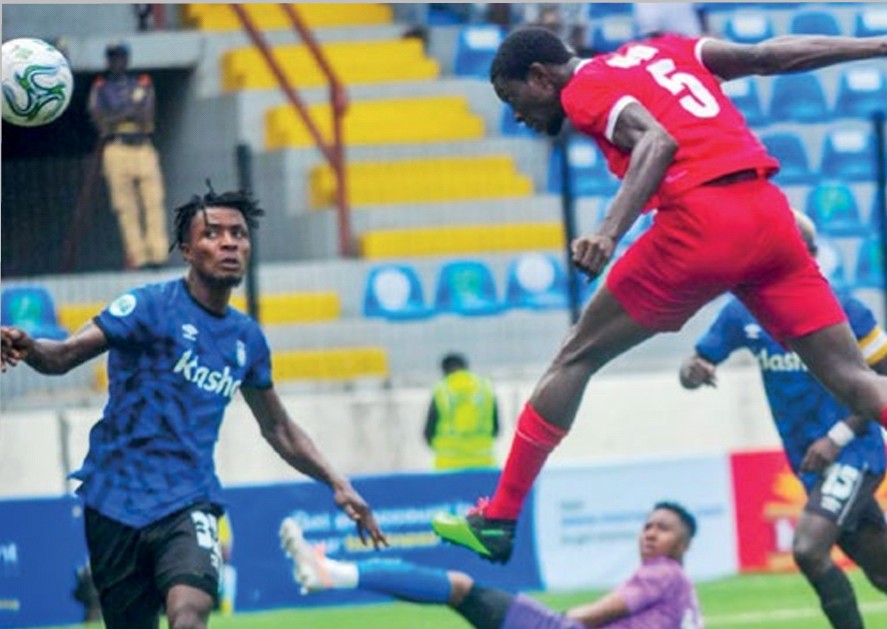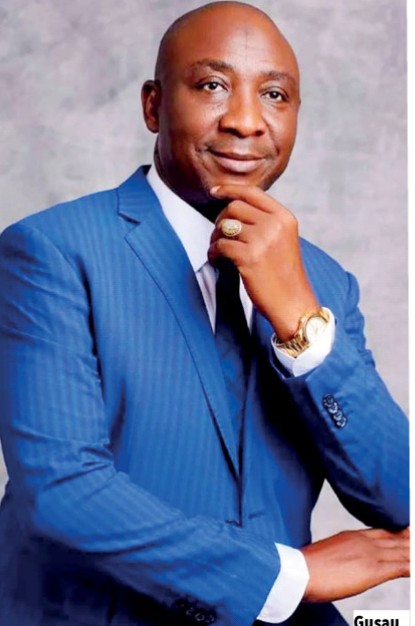The Naija Super 8 Football Tournament, played at the Mobolaji Johnson Arena at the Onikan Stadium in Lagos, captivated football enthusiasts and earned widespread recognition for its seamless organisation and captivating competitive atmosphere. The widely successful competition led many in the country asking how come a domestic tournament can capture the attention of fans so concretely that the stadium was filled to capacity for the matches, especially the nail-biter of a final. What actually contributed to the tournament’s success and what valuable lessons can it offer for Nigeria’s domestic football landscape? SportsLive offers answers by looking at the positives of the football tournament.
The Naija Super 8 Football Tournament was conceptualised as an innovative initiative to promote and revitalise Nigerian domestic football. Recognising the need to rekindle fan interest and enhance the appeal of local football, the organisers, led by Jenkins Alumona, Managing Director, Flykite Productions, devised a unique format that combined spirited competition with significant incentives for clubs and players alike. The tournament sought to celebrate and showcase the abundant football talent present within the country, fostering a renewed sense of enthusiasm and pride among football fans.
Organising a football tournament of this scale entails a myriad of challenges that demand astute problem-solving and flexibility from the organisers. Several key challenges arose in the pre-tournament phase. One of the prominent challenges faced by the organisers was related to security arrangements. A disagreement with the Lagos State Football Association Vice Chairman, Alhaji Olawale Gafar, over security provisions at the Mobolaji Johnson Arena threatened to disrupt the event’s smooth organisation. However, through constructive dialogue and collaboration, the issue was eventually resolved, ensuring the safety and security of players, officials, and spectators.
Another major hurdle arose with the unexpected extension of the Nigeria Premier Football League (NPFL) season, as communicated by the Nigeria Football Federation (NFF). This unforeseen extension necessitated the rescheduling of both the zonal play-offs and the main tournament dates, posing logistical challenges and requiring adjustments to accommodate the changes effectively.

Despite these obstacles, the organisers demonstrated resilience and adeptly navigated through these issues to ensure the successful execution of the tournament. The astuteness of the organisers was recognised by those who were involved and who participated in bringing it to fruition. The Naija Super 8 Football Tournament garnered remarkable support from a coalition of prominent brands that recognized the tournament’s potential to invigorate Nigerian football and engage a vast audience of football enthusiasts. The brands that generously backed the competition as sponsors included Nigeria’s leading telecommunications company, MTN Nigeria. The network has a strong commitment to supporting sports and community development initiatives and it backed the Super 8 all the way. Another backer was Hero Lager, a renowned beer brand known for its involvement in promoting sports and entertainment events in Nigeria. DStv, Nigeria’s most popular digital satellite television service provider, kept faith with the competition, in tune with their consistent patronage of Nigerian football.
Other sponsors included: SuperSport, the widely recognized sports broadcasting network known for its extensive coverage of various football leagues; Pepsi; Moniepoint, a digital financial services platform that supported the tournament as part of its commitment to community engagement; and Custodian Assurance Limited, an insurance company that actively invests in corporate social responsibility endeavours, including sports sponsorships. The collective support of these esteemed brands significantly contributed to the success of the tournament, elevating its visibility and impact on Nigeria’s football landscape.
The Naija Super 8 Football Tournament was designed to be a compelling and alluring spectacle for football enthusiasts and the wider public and by the final on July 16, it was obvious that they had achieved what they set out to do. Several key features contributed to its attractiveness.

Topmost of these features was fan engagement. The organisers devised a novel voting process that actively involved football fans in selecting the clubs to participate in the tournament. The club selection process for the Tournament was designed to be inclusive, transparent, and reflective of popular opinion. To ensure a fair representation of clubs from various regions, the organisers employed a voting system that extended beyond Nigeria’s borders, allowing football fans from Nigeria, Republic of Benin, Ghana, and South Africa to cast their votes. The voting process was accessible through online platforms, which facilitated widespread participation.
The clubs that secured the highest number of votes in each of the six geopolitical zones advanced to the zonal play-offs, where they competed for a coveted spot in the Super 8 tournament in Lagos. This approach promoted inclusivity and democratisation of the club selection process, ensuring that a diverse array of teams had the opportunity to showcase their talent on a national stage. This democratised selection process empowered fans, making sure they played a crucial role in determining the lineup of participating teams. The fan engagement initiative not only piqued interest but also fostered a sense of ownership and emotional investment among supporters.
To uphold the integrity and credibility of the club selection process, the organisers collaborated with the reputable audit firm Deloitte to oversee the voting process. Deloitte’s involvement lent an objective and unbiased dimension to the proceedings, providing stakeholders and football enthusiasts alike with confidence in the fairness and accuracy of the final results. The voting process was closely monitored to prevent any potential irregularities or manipulation, ensuring that the clubs chosen to participate in the tournament truly represented the collective will of football fans from across the regions.
Another big positive was the prize money involved for participating clubs. The organisers introduced a significant financial incentive to motivate participating clubs. Each club earned N3 million per game, and the runner-up was awarded N9 million, while the victorious team received a grand prize of N25 million.
This substantial prize money not only served as a reward for outstanding performance but also presented an opportunity for clubs to invest in player talent and infrastructure, ultimately bolstering the overall quality of Nigerian football.
There was also incentive for the players to give it their best. Recognizing individual brilliance and talent, the tournament also awarded prize money to outstanding players. The best player in each match received N250,000, and players selected in the Team of the Tournament were each rewarded with N100,000. This not only elevated the spirits of players but also promoted healthy competition and sportsmanship throughout the tournament. This combination of fan engagement, attractive prize money, and recognition of player excellence contributed to the tournament’s appeal, making it a sought-after event in the Nigerian football calendar. The availability of affordable tickets (N200 for entry) and adequate security arrangements made it possible for the numbers that thronged to the matches.

The zonal play-offs held in Eket produced six formidable teams that emerged as the top voted for teams from each geopolitical zone and qualified for the Naija Super 8 finals in Lagos: Yobe Desert Stars, Katsina United, Akwa United, Enyimba International, Remo Stars, and Lobi Stars. They were joined by Shooting Lagos and Rivers United as wildcard entries. They engaged in an all-out battle for the top prize until only the finalists remained. The pinnacle of the Super 8 was reached when the two top teams, Remo Stars and Sporting Lagos, battled it out in the grand finale, culminating in a thrilling and memorable showdown. Remo Stars, armed with a highly competitive squad and bolstered by their commendable run throughout the tournament, entered the final with determination and grit. Sporting Lagos were the underdogs. A team on the rise, Sporting FC Lagos showcased tremendous potential and determination, dazzling fans with their flair and skill.
The final was a fiercely contested encounter, with both teams giving their all to secure victory. The match concluded in a 1-1 draw during regulation time, leading to a tense and electrifying penalty shootout. Ultimately, Sporting FC Lagos emerged triumphant, edging past Remo Stars with a 4-2 penalty shootout victory. The jubilant celebrations that ensued reflected the passion and commitment demonstrated by both teams, solidifying the Naija Super 8 Football Tournament’s position as a premier footballing event in Nigeria.
The resounding success of the Naija Super 8 Football Tournament can be attributed to a confluence of factors that cohesively contributed to its triumph: The involvement of a reputable audit firm such as Deloitte to oversee the voting process instilled confidence in the transparency and integrity of the club selection procedure.
This impartial oversight bolstered the credibility of the tournament and fostered trust among football fans. The introduction of substantial financial rewards for both clubs and players elevated the stakes of the tournament and acted as a powerful motivator for exceptional performance.
The enticing prize money not only attracted top-tier talent but also incentivised players to display their best skills throughout the competition.
Also, recognizing the significance of fan engagement, the organisers orchestrated a captivating experience for spectators at the matches. The inclusion of live music performances, interactive activities, and fan-centred initiatives created a carnival-like atmosphere, drawing larger crowds and elevating the overall matchday experience. Meticulous planning and coordination played a pivotal role in the seamless execution of the tournament. Collaborative efforts with various stakeholders, including sponsors, government authorities, and local communities, ensured that the necessary infrastructure and facilities were provided to support the event. The efficient organisation contributed to the smooth running of the tournament, further enhancing its reputation as a well-managed and professionally organised competition.
The triumph of the Naija Super 8 Football Tournament holds valuable lessons that can significantly impact the trajectory of Nigerian domestic football. The integration of fans in the decision-making process, as seen in the voting system, enhanced their sense of involvement and emotional connection to the tournament. Nigerian football can learn from this approach and seek ways to actively involve fans in various aspects of the sport, thereby fostering a deeper sense of loyalty and support for local teams.
The success of privately-owned clubs, like Sporting FC Lagos, exemplifies the potential impact of private investment in Nigerian football. Encouraging more private ownership and corporate partnerships can bolster the financial stability and long-term growth of football clubs in the country.
Collaborating with reputable and committed brands can provide vital financial support and enhance the overall appeal of domestic football tournaments. By leveraging partnerships with sponsors, Nigerian football can create sustainable revenue streams and attract larger audiences. Upholding transparency in all facets, from club selection to financial matters, is crucial in nurturing trust and credibility among stakeholders. By maintaining openness and accountability, Nigerian football can cultivate a positive image and garner increased support from fans and sponsors alike. Investing in the development of high-quality facilities and playing surfaces is instrumental in elevating the standards of domestic football. Adequate infrastructure not only improves the playing conditions but also positions Nigeria as an attractive destination for hosting high-profile football events, further enhancing the sport’s profile.
The Naija Super 8 Football Tournament has set a new standard for domestic football in Nigeria, exemplifying the potential of creative ideas, fan engagement, and meticulous planning in shaping successful football events. Through the combined efforts of the organisers, sponsors, players, and football fans, the tournament showcased the wealth of talent and passion that underpins Nigerian football. The resounding success of the Naija Super 8 offers a beacon of hope and inspiration for the future of Nigerian domestic football. By embracing the valuable lessons learned from this tournament, stakeholders can collectively elevate the standards of the sport, nurture fan engagement, and create a sustainable and vibrant footballing ecosystem for generations to come. As the sport continues to thrive and evolve, the Naija Super 8 Football Tournament remains an enduring testament to the power of unity, innovation, and passion in shaping the trajectory of Nigerian football
About the Author
Jude Obafemi is a versatile senior Correspondent at THEWILL Newspapers, excelling in sourcing, researching, and delivering sports news stories for both print and digital publications.





